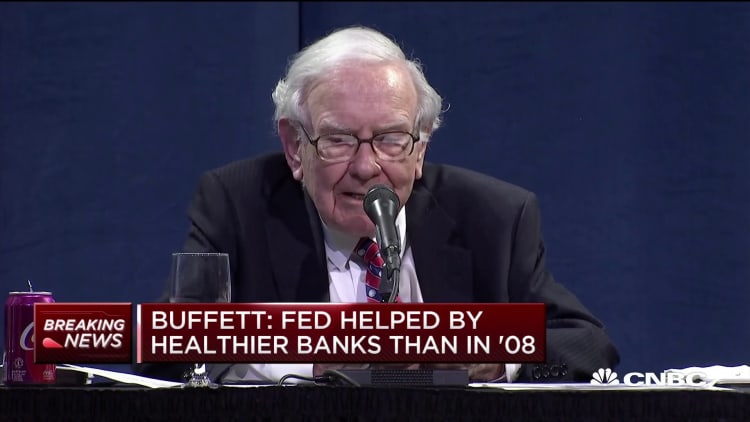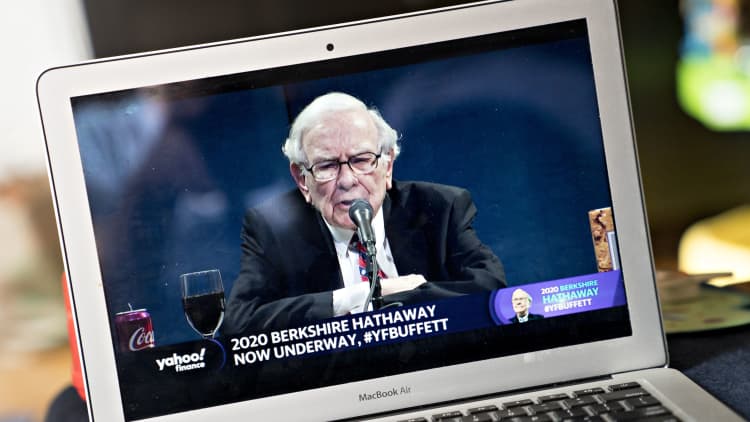
Warren Buffett praised the Federal Reserve for its actions to blunt the effects of the coronavirus but said he worries about the repercussions.
Speaking at Berkshire Hathaway's annual investor meeting Saturday, Buffett said companies struggling to make it through the current period of social distancing owe thanks to the Fed for providing low-interest financing that is helping keep them afloat.
Without mentioning specific worries, Buffett said he is concerned about the longer-term ramifications.
"We're doing things that we really don't know the ultimate outcome to," the 89-year-old investing legend said at the virtual meeting. "I think in general they're the right thing, but I don't think they're without consequences, and I think they could be of extreme consequences if pushed far enough. But there would be kind of extreme consequences if we didn't do it as well."
The Fed sprung into action as the coronavirus pandemic caused businesses across the U.S. to halt operations abruptly.
Similar to what it did during the Great Recession, the central bank slashed its benchmark short-term interest rate to near zero and began buying Treasurys and mortgage-backed securities. However, this time it extended its operations to lend to businesses large and small, bought money market funds and municipal bonds, and went much further out on the risk-spectrum by buying high-yield corporate debt.
Doing so has provided some stability to financial markets but also raised questions of moral hazard that come with public rescue operations.

Putting the Fed on 'a pedestal'
Buffett, though, said companies that were able to borrow under the current operations "should send a thank-you letter" to Fed Chairman Jerome Powell and his fellow central bankers.
"Jay Powell, in my view, and the Fed board belong up there on a pedestal," he said. "They acted in the middle of March probably somewhat instructed by what they'd seen in 2008 and '09. They reacted in a huge way and essentially allowed what's happened since that time to play out the way it has."
Prior to the Fed's intervention, the corporate debt markets had seized up and yield spreads against government bonds of similar duration hit levels not seen since the financial crisis a decade earlier.
Debt issuance since then has exploded, with March and April setting records with $253.3 billion and $261.8 billion respectively, according to the Securities Industry and Financial Markets Association. March was a quiet month in the high-yield market, but it bounced back in April to $33.7 billion after just $3.5 billion the month before.
That's happened even though the Primary and Secondary Market Corporate Credit facilities, which the Fed announced as vehicles through which it will buy corporate debt, are not yet operational.

While the rebound in corporate debt is indicative that capital markets are working again, it also raises the specter that companies with bad balance sheets are being propped up artificially. Debt issuance was 78.1% higher through April than it was for the same period in 2019, according to SIFMA.
"My own sense is the Fed went too far in going to the high-yield market. But I understand why they did it, and time will tell what the consequences are," Mohamed El-Erian, chief economic advisor at Allianz, said Monday on CNBC's "Squawk Box" program. "The Fed opened up the high-yield market for almost everybody, and that raises the specter of zombie companies, and we've got to be careful about this because that eats away at what makes America special."
The Fed essentially set itself up as the market for corporate debt, a role Buffett helped play during the last financial crisis.
Back then, Buffett took huge stakes in financial companies like Bank of America and Goldman Sachs, providing capital and liquidity to markets that had shut down. Both proved to be good moneymakers for Berkshire as well.
But Buffett has added to cash during the current period and has not made any significant buying moves, with his most notable transaction being his move away from airline stocks.
He said the Fed's moves essentially removed the kind of bargains he found during the previous crisis.
"We haven't seen anything attractive. ... The Federal Reserve did the right thing, and they did it very promptly, which they should have, and I salute them," Buffett said. "We have not done anything, because we don't see anything that attractive to do. That could change very quickly, or it may not change."



